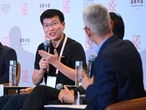Some startups support grind culture by expecting employees to work 80 hours a week every week, and for every other part of their life to take a back seat until the work is done. Even some employees at enterprise companies are expected to be on email and Slack 24×7, with their phone at their bedside table and the ringer on, just in case someone happens to call in the middle of the night.
In grind culture, this relentless hard work is super important—and if you’re not constantly productive, you’re failing. Tangible achievements like financial gains or a promotion in record time often mark it. Anything other than success is just a waste of time.
It’s pretty obvious how this grind culture, over time, presents major problems. Burnout for one, a negative impact on mental health, and relationships with friends, family, and even coworkers. It sets unrealistic expectations for performance and it perpetuates perfectionism. It’s just flat-out unsustainable long-term and unfair to employees.
The question is, what can managers do about it?
This type of always-on behavior runs counter to a positive culture and should not be incentivized. One of the values at my company is: “We work hard and go home.” It’s critical to our operating system and one we’ve stood behind since day one. But most importantly, it’s something that we’re always adjusting and improving.
In fact, this year we heard feedback and observed that the value was being misinterpreted or misapplied. So we rewrote its definition and when relaunching it, we shared guidance for living this value. Everyone’s lives outside of work are different, and so there is no one-size-fits-all answer to achieving work/life balance. By sharing our stories and how we wrote this value, the responsibility is on each of us to define the boundaries that work for us.
To help folks understand how to create their own boundaries, we’ve been open about sharing how this looks for others. It starts with me as the CEO. I establish and model consistent work hours where I shut my laptop at 5 p.m. daily and spend time with my family. If I’m underwater, I will open my laptop at 7 p.m. or over the weekend, but I don’t have Slack notifications on my phone. If someone needs to urgently reach me, they know how and do so sparingly.
For one of my colleagues, everything from her core working hours to how and when she takes vacation looks totally different. Every few months, she’ll take a week off from all meetings to catch up on tasks and deep thinking. She will send Slack messages on PTO and won’t apologize for it. And, she takes the flexibility she needs for family and life.
When it comes to preventing grind culture, it’s up to each individual to set their own boundaries. But this gets tricky. The only real rules are:
- Boundaries have to be realistic. You actually have to get your job done.
- Your boundaries cannot place an undue burden on your team.
For managers, it’s important to hone this over time and to respect the boundaries others set. Employees choose to work for a company, and some weeks that involves a lot of hours, and some days you just have to close your laptop early because your brain is fried. Work should be enriching, not something that crowds every other aspect of one’s life. This standard operating system enables that.
It’s not always easy to create this type of culture. As a leader, I’m focused on creating more time for deep and asynchronous work. This fall, we’re launching a weekly company-wide “no internal meeting” day. It’s not a novel concept, but our sincere goal is to materially increase space for getting shit done and reduce meeting fatigue. We expect folks to have more time to advance their highest-impact work and are giving clear guidance on how to actually do this.
This solution surfaced from a candid conversation among three of our leaders about the tensions they were feeling. Employees weren’t responding to messages or emails because they were in meetings for 10 or 12 hours a day. It was slowing down decisions. It was overwhelmingly frustrating. And folks were focused on too much work versus doing the right work. Within six weeks of this conversation, we proposed and set up this solution. If it doesn’t solve these tensions, we’ll cancel it and try something else.
At the end of the day, work isn’t our entire identity. Our culture starts with me. I have to believe it and live every part of it. I have to talk about “working hard and going home” often and share my own stories. Then I have to empower those around me to establish their norms and their own boundaries.
For managers in similar situations, my advice is to be very intentional about the team and company you’re building. It’s not about rewarding grind culture or about always being on. It’s about building something great with the best group of people while creating space for everyone to be their whole self and bring all that to work.








No comments